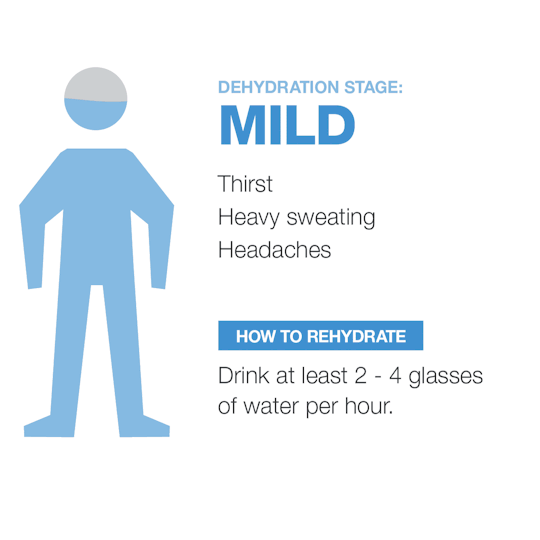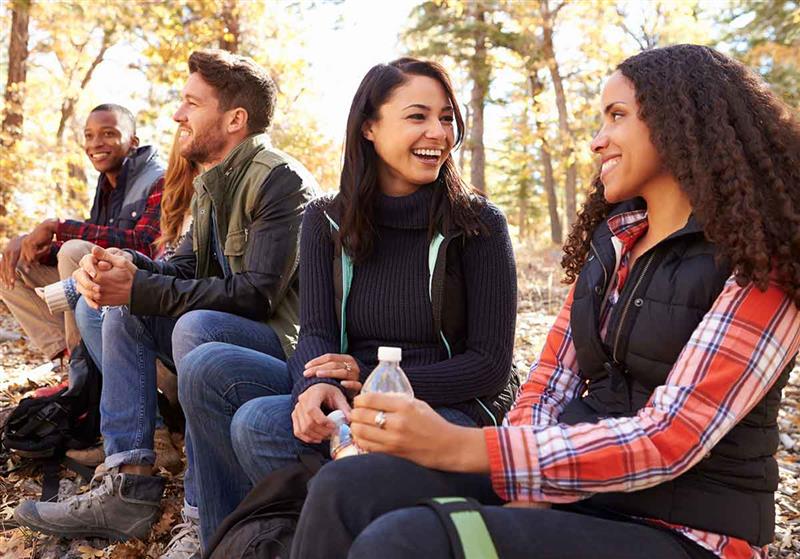
As temperatures heat up this season, be sure to get smart about liquids. Whether you are exercising, sitting out in the sun or traveling, here are tips and info to keep yourself hydrated.
Dehydration is classified as mild, moderate, or severe, based on how much of the body’s fluid is lost or not replenished. If left untreated, dehydration can become a severe, life-threatening emergency. In these cases, seek emergency medical help immediately. Drinking water and other fluids before going out into the sun is an important first step to stay hydrated in the heat.

How is heat dangerous?
Your body cools itself by sweating. But in the heat, your sweat can’t evaporate fast enough, causing your body temperature to rise. Heat-related illnesses can happen when your body temperature gets too hot. One way to check your hydration is a urine color test. Light-colored urine likely means you are hydrated. The darker the color, or the less often you urinate, the more dehydrated you are.

How do you stay hydrated in the heat?
Water is vital to most bodily functions: regulating your body temperature, transporting oxygen and nutrients throughout your body, and breaking down waste. Your body needs more water to stay hydrated when it’s hot outside, and while water is usually the best choice, almost all liquids count towards hydration needs.
For most outdoor activities, water is the best fluid to drink to stay hydrated. When you head into the summer heat, you might sweat more, so be sure to drink more water—and don’t wait until you’re thirsty. Beverages with caffeine may cause you to urinate more than usual, but they don’t seem to increase the risk of dehydration. Alcoholic drinks may also increase urination, which could lead to dehydration.

If you plan to be sweating a lot or in the heat for awhile, you may want to carry a sports drink. Heavy sweating takes essential minerals out of your body, such as sodium (salt) and electrolytes that help regulate the amount of water in your body. Sports drinks are designed to replace electrolytes lost through heavy sweating and help your body absorb water.
Who is at risk of heat-related illnesses?
People at higher risk of heat-related illness include: children, seniors, people who are overweight, those who often work or exercise outside, and those with illnesses or ongoing medical conditions such as heart disease or diabetes. Some medications can increase your risk for heat-related illness if they prevent sweating, reduce blood flow or affect fluid levels.
Be well, stay well ~
Pharmacist Andy
Andy Stergachis, Ph.D., R.Ph. is the Director of the Global Medicines Program at the University of Washington in Seattle and a subject expert on public health and pharmacy-related topics.
Source: http://www.mayoclinic.org/diseases-conditions/dehydration/basics/symptoms/con-20030056
https://familydoctor.org/dehydration/
http://www.nationalacademies.org/hmd/Reports/2004/Dietary-Reference-Intakes-Water-Potassium-Sodium-Chloride-and-Sulfate.aspx
https://www.mayoclinic.org/healthy-lifestyle/nutrition-and-healthy-eating/expert-answers/caffeinated-drinks/faq-20057965
https://www.ncbi.nlm.nih.gov/pubmed/26702122
https://www.mayoclinic.org/diseases-conditions/hangovers/symptoms-causes/syc-20373012
Clinical review by Walgreens clinical team 3/26/2019

